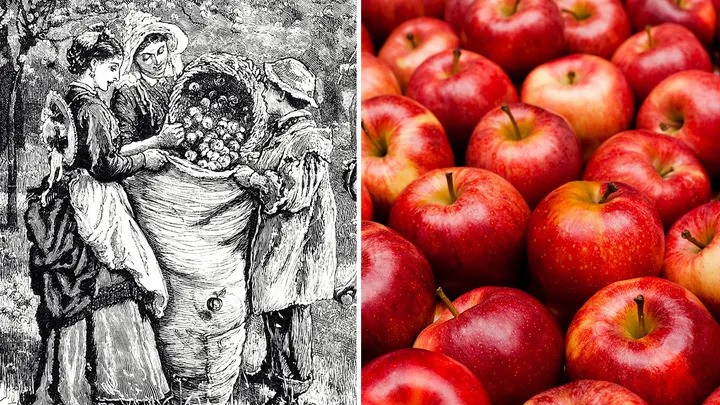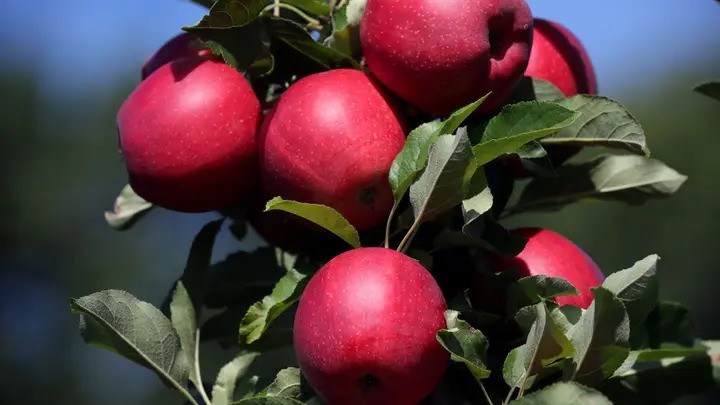This fall, when you pick a crisp apple or enjoy a slice of your grandmother’s apple pie on Thanksgiving, remember William Blaxton. This eccentric English settler planted the first apple orchards in what would later become the United States. Reverend Blaxton’s legacy is intertwined with one of America’s most iconic fruits—apples.
Blaxton, known for his reclusive nature, planted the seeds that not only nurtured America’s orchards but also helped craft the image of the apple as a symbol of wholesomeness and simplicity. Historians believe that his efforts to cultivate apples in the 1620s along the Shawmut Peninsula, now known as Boston, make him a pioneer in American horticulture.
A Pioneer Ahead of His Time
Long before the Puritans set foot in Boston, William Blaxton had already established his roots. He settled in the area five years before the arrival of the Puritans and later moved to Rhode Island, a year ahead of Roger Williams. Blaxton’s pioneering spirit was key to the spread of apples across the nation.

“There may be historical characters who did more than he did for apples in America, but he was certainly the first — and at least the first known — to bring this exotic crop to our shores,” said John Bunker, an American apple expert, grower, and author. “That’s a pretty awesome legacy,” added the apple enthusiast, who spoke to Fox News Digital while “tracking down ancient trees” in rural Maine.
Apples: A Taste of the Old World in the New
America’s love affair with apples runs deep. The Big Apple is the nickname for the nation’s largest city, while phrases like “American as apple pie” cement the fruit’s place in our culture. However, apples aren’t native to the Americas—they originated in Central Asia, likely Kazakhstan, before reaching Europe by the time of Ancient Greece and Rome.
“I looked to have dwelt with my orchards and my books in undisturbed solitude,” reads a memorial dedicated to Blaxton, highlighting his love for solitude and cultivation. Alongside other European settlers, Blaxton introduced the apple to the New World after the voyages of Christopher Columbus initiated one of history’s largest cultural exchanges.
A Solitary Life in the Wilderness
Born in Lincolnshire, England, in 1595, William Blaxton endured significant hardship early on. His mother died when he was still a boy, and after his ordination by the Church of England in 1621, he lost his father the following year.
Despite these personal losses, Blaxton made his way to the New World aboard the ship “Katherine” as a chaplain.
“William brought with him to the New World a large collection of books, approximately 186 in various languages,” wrote Nathaniel Brewster Blackstone. A biographer of Blaxton and his descendants.
Choosing to stay in the New World when Captain Richard Gorges abandoned their ill-fated settlement in Weymouth, Blaxton made his way to the Shawmut Peninsula, the site of modern-day Boston. In 1630, John Winthrop and the Puritans arrived, but tensions between the reserved Blaxton and the stern Puritans led him to move once again.
A New Start in Rhode Island
Blaxton’s eccentric personality didn’t mesh well with his new neighbors, and in 1635, he relocated to what is now Cumberland, Rhode Island, settling along the Blackstone River. “Because of theological and territorial disagreements with his new neighbors, Blackstone moved west in 1635 to enjoy the solitude and tranquility of a place he called ‘Study Hill,’” reads the Rhode Island Heritage Hall of Fame.

His move to Rhode Island gave Blaxton the unique distinction of being the state’s first permanent English settler. And it was in these tranquil settings that he continued cultivating his apple orchards. When Governor Winthrop encountered him in 1630, Blaxton had already planted roots—both literally and figuratively.
“As for the apple seeds he used to develop his orchards, it is probable that he was foresighted enough to retrieve and save every apple core (which naturally contains seeds) he could find, or otherwise come by,” Brewster Blackstone noted in his biography.
A Fruitful Legacy
Blaxton’s Boston orchards are likely the origin of the earliest known American apple varieties.
“I love to imagine Beacon Hill covered with all those apple trees,” shared Amy Traverso.
Food editor of Yankee Magazine and author of The Apple Lover’s Cookbook.
While the exact types of apples Blaxton planted are unknown, experts believe heirloom varieties such as the Roxbury russet, Rhode Island greening, and yellow sweeting descended from his trees.
“Apples teach us what it means to be alive and joyful on earth,” said John Bunker, emphasizing the deep-rooted connection between the fruit and American culture.
The Lasting Impact of William Blaxton
Though William Blaxton died in Cumberland in 1675, his influence is still evident today. Boston Common, the land he sold to the Puritans in 1634, remains the oldest public park in America. Blackstone Street, Blackstone Elementary School, and the Blackstone River—all bear his name, paying homage to this eccentric pioneer who brought more than just apples to American shores.
“Apples are just like us,” said Bunker. “They come in many colors, many sizes and many shapes. They are well rooted, just like we all want to be. They are collaborative, communicative — and they gift us with beautiful fruit.”



